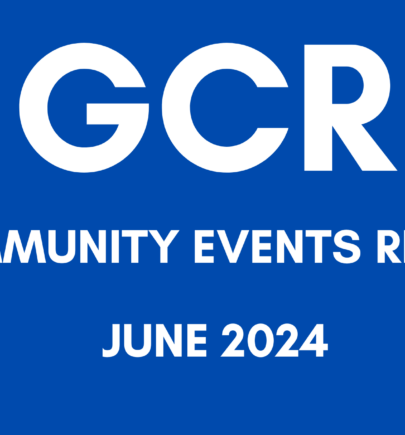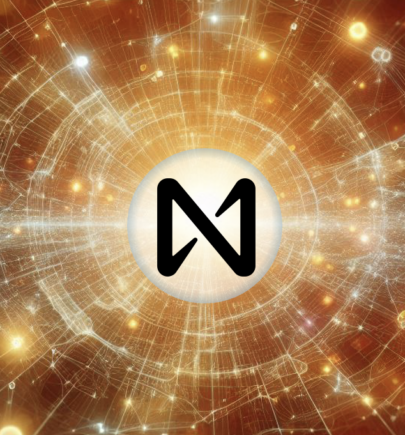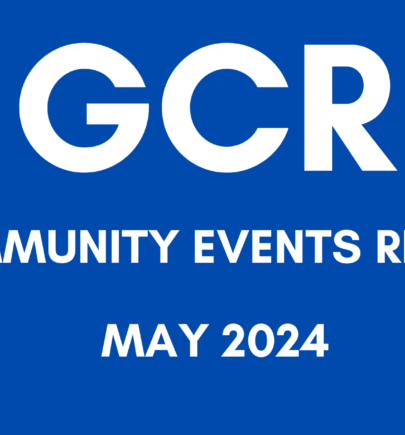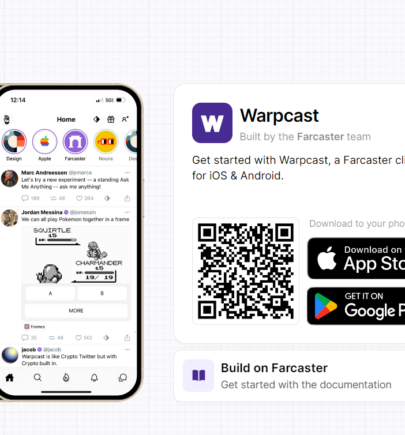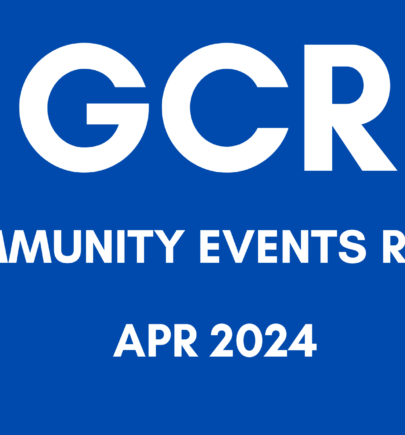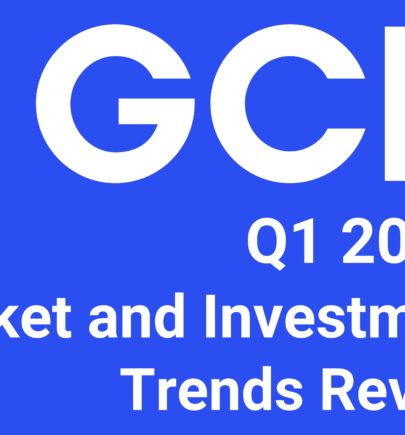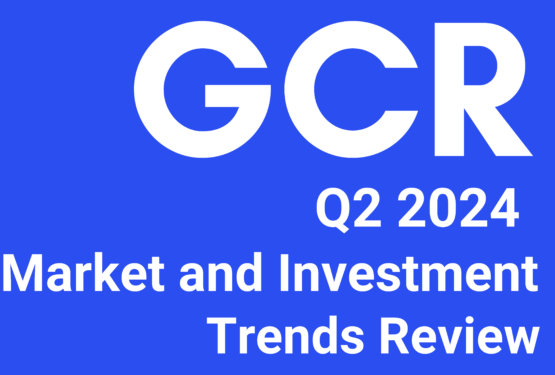Interviews on 2019 Outlooks from the World Digital Asset Summit with Metastable Capital, Nathaniel Popper, Multicoin Capital, Near Protocol, Cryptokitties, Primitive Ventures, LayerX
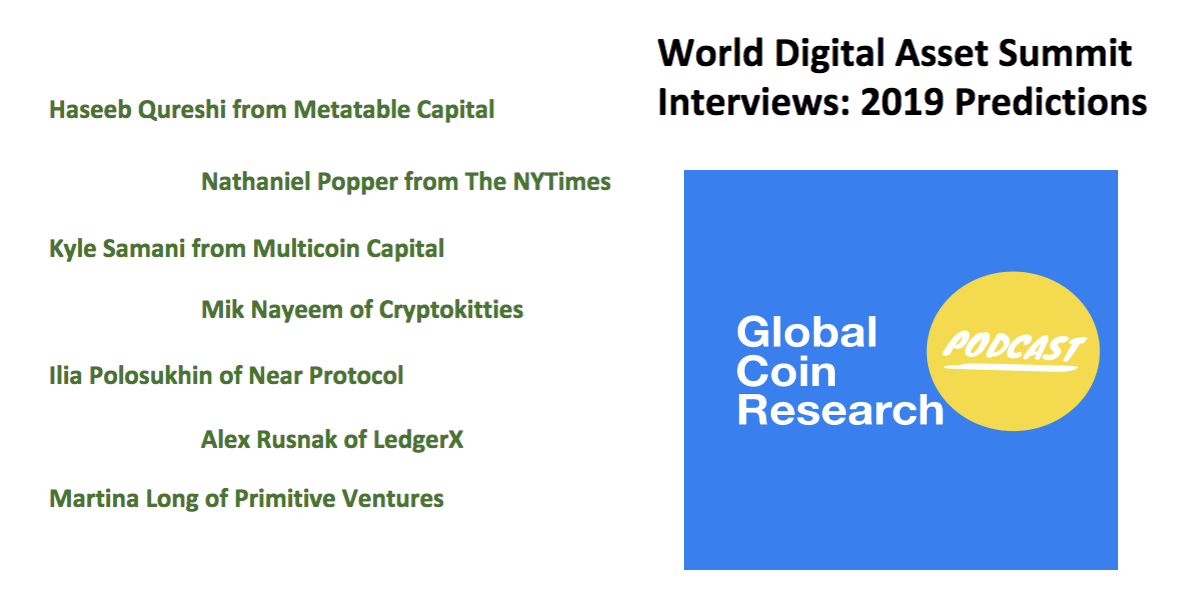
We have prepared a very special episode for our listeners just in time as we go into 2019. I emceed and moderated at the World Digital Assets Summit in San Francisco this past week, and also got the chance to speak with a number of fantastic funds,projects and reporters who were present. As we go into the New Years with some uncertainty as an industry, it is refreshing to hear different perspectives from a number of thoughtful, experienced individuals on their outlook for 2019.
This podcast is a compilation of 7 separate conversations that I had with individuals and I highly recommend you to listen to each and every one of those conversations. On the funds side, I spoke with Haseeb Qureshi from Metastable Capital, Kyle Samani from Multicoin Capital, Alex Rusnak from LayerX, Martina Long from Primitive Ventures. I had the pleasure of catching up with Nathaniel Popper from the NY Times. And on the projects side, I spoke to founder of NEAR Protocol Ilia Polosukhin and Cryptokitties’ Chief Business Officer Mik Nayeem.
Here are some highlights from my conversations and their timestamps, make sure to listen to it and become a premium reader NOW to access to the summarized transcripts and future deep insights:
1:45 Haseeb Qureshi from Metastable Capital– thoughts on stablecoins and Metastable’s investing approach going into 2019.
11:09 Nathaniel Popper from the NY Times– on what he’s thinking about writing on in this space now since covering Bitcoin in 2013
17:40 Near Protocol founder Ilia Polosukhin- on recent team hiring, developments in 2019
21:00 Cryptokitties Chief Business Officer Mik Nayeem– on why consumer dApps companies like Cryptokitties are more pessimistic about 2019 than the protocols
27:40 Kyle Samani from Multicoin Capital- technologies he’s spent the most time researching in 2018 and what those will be in 2019
31:10 Alex Rusnak from LayerX– detailed predictions on the timeline of tech and project developments in 2019
38:45 Martina Long from Primitive Ventures– Primitive’s views on the rift between east and west and how they approach that as a global fund
Listen to it on iTunes or here on Soundcloud:
Joyce Yang
Hi everyone. Welcome to the global coin podcast. A podcast where we hear from leading global operators and investors in crypto, with their thoughts on the Asia Blockchain and cryptocurrency space. Asia is really a cryptocurrency hub, and understanding the region is as important as understanding what’s going on locally. We also have a newsletter that highlights all the important crypto news coming out of Asia, with many translated by our staff directly from the local media. Check it out at globalcoinresearch.com. I’m your host Joyce Yang. Today, we have a very special episode just in time for the new year. I am seed and moderated at the world digital asset summit in San Francisco this past week and also got the chance to speak with a number of fantastic funds, projects and reporters who were present. as we go into the new year with a sight of trepidation and certainty as an industry, it is refreshing to hear different perspectives from a number of thoughtful experienced individuals on their outlook for 2019. this podcast is a compilation of 8 separate conversations that I had with individuals. on the fund side, I spoke with Haseeb Qureshi from Metatable, Kyle Samani from Multicoin Capital, Alex Rusnak from LayerX, Martina Long from Primitive Ventures. I had the pleasure of catching up with Nathaniel Popper from the New York Times. and on the project side, I spoke to Near Protocol and CryptoKitties. as we share each of these conversations, we will be professing them with a quick introduction on the person and their organization. first off, we have Haseeb Qureshi from Metatable Capital. Haseeb is a general partner at Metatable Capital, a cryptocurrency hedge fund. hi Haseeb, thanks for coming.
Haseeb Qureshi
Yeah of course my pleasure.
Joyce Yang
How are you enjoying this conference?
Haseeb Qureshi
It has been interesting.
Joyce Yang
Yeah what does that mean?
Haseeb Qureshi
Definitely a different vibe in the big market. The winter of 2018; I think a lot of people will remember this as being a very distinctive time for crypto. It’s kind of like the deepest inflection point of sentiment. No it’ll be okay, it’ll be okay and now, we’re like no, it’s not okay. But I think it kind of you know crypto goes through this every few years and you kind of need this right. There was a little bit too much uninformed enthusiasm to be healthy. So obviously, it’s a painful time and there’s less smiles and there’s less people were just kind of irrationally exuberant about this market, but overall, I think it’s a sign of maturity.
Joyce Yang
For sure. I think that’s definitely a good thing for the space and you still have a smile on your face. So what are you excited about for 2019?
Haseeb Qureshi
What am I excited for 2018? 2018 or 2019?
Joyce Yang
2019.
Haseeb Qureshi
2018; not much except maybe going to see family. I think 2019 is really going to be an obscene year. Crypto ultimately is very narrative driven. And ultimately for crypto to rally and for people to get excited about it, it needs to book some real wins. And this year, they’re just haven’t been real wins. There’s only been failures. There’s only been people realizing that they were sold a false bill of goods about ICOs and about all this IOT, whatever blah blah, quantum proof, BS. And the reality is like you know Blockchain is early stage experimental technology. Like it’s so obvious if you actually can write the stuff, but it’s just really early. This stuff doesn’t really work yet. Next year, we’re going to see a lot of launches from projects so they think part basically like the next generation of projects that have built. Mostly after ethereal, they have built on a lot more research and a lot more different varied ideas. You know 2.0 is probably 2 to 3 years away from being like really fully fledged, but next year we’ll see the first glimpse of you know what does it look like when people build these new next-generation protocols? Are they more usable? Do they have way lower latency? Are they really as scalable as they claim to be? And if so, what can we build on top of that? I think that’s going to be really interesting. No idea if it’s going to bring the next bull market. I mean I think it really probably depends in a large part on do these things live up to their promises? And are they as effective as they claim? But I think is really interesting.
Joyce Yang
Yep and can you name any projects that you are particularly excited about and that are really to launch in 2019?
Haseeb Qureshi
So I think right now, nobody is really committing to a launch date but generally speaking, I’d say it’s sounds like a lot of projects like Dfinity, Thunder, Oasis, Algorand, hoping for Spacemesh; there are a number of other projects that are in the pipeline that they raised really big rounds last year and occurred this year rather, and I think 2019 is probably the year when they’re going to have to go to market is because other of their competitors are going to market. And so I’m really intrigued to see how this raise plays out.
Joyce Yang
Yes, me too. And what about the innovation space where we seeing perhaps new types of products coming out or ICO forms for example, I don’t know if you know Binancechain is coming out with the ICO platform and they’re going to do a lot of fun stuff in Singapore. I think that’s quite interesting.
Haseeb Qureshi
I think kind of a too little too late. I think the ship has sailed the idea of an ICO being essentially in a legal securities offering. I think ICOs are a really awesome idea and I think they are going to be important going forward. This idea of the global fluid capital market is an important idea. I think you saw a glimpse of it last year, but it’s going to take a lot more infrastructure and a lot better institutions than what we had available last year. Last year, it was just a complete free throw and I think as there’s more exploration of security tokens and other innovations on top of the capital raising mechanisms that we kind of traditionally have in the world that are all kind of segregated by country and very old-school and you know walked into these calcified mechanisms that we just had for like 50 years. There’s a lot of innovation happening there, but it’s going to happen at a very different way than what we might have thought. So I think a lot of what we’re going to see over the next couple years is crypto really growing up and maturing and realizing that you can’t throw away everything and say “hey, it’s free for all.” You know libertarianism, crypto Anarchy, rah rah rah… it doesn’t work. We tried it and you just got a bunch of scammers and a bunch of projects and a bunch people got mad and lost money and… you know like it doesn’t work. The capital markets are highly regulated and maybe it’s suboptimal the degree to which they’re regulated, but they’re regulated for a reason. They have good norms and institutions around like preventing what happened in the ICO market. And so CryptoKitties is going through this process of relearning the lessons of what traditional financial markets have known for a very long time except without the benefits of like a court of law on the Blockchain, without the benefits of being able to like throw scammers in jail on the Blockchain. The only way to resolve that is to build good institution and crypto is now on its way of building these good internal institutions. You have Binance, you have CoinBase, you have Messari, figuring out what is the right way to self-regulating and increase the right set of norms around. How crypto evolves and becomes a better form of what it is today. And I think we’re getting there, but all that stuff takes time and it takes lots and lots of f**k ups on the way. And we’ve gotten to share our f**k ups and hopefully, we’ve gotten the f**k ups out of the way and…
Joyce Yang
There will be more f**k ups coming.
Haseeb Qureshi
I’m sure we’re not done yet, but the development of institutions; I think is also coming along.
Joyce Yang
Yes, that’s great. And what about stablecoins? I love to hear your thoughts on that.
Haseeb Qureshi
Yeah stable coins Ithink are super important idea obviously like the volatility of crypto makes it infeasible for a lot of applications or a lot of financial use cases that people want such as paying something like salary. In crypto, you can’t do that because volatile. Denominated in loans, prediction markets, any kind of long term bet. All those things really require stable coins. So we’re seeing a lot more competition with stablecoins, and also a lot better again, institutions behind stablecoins, like tether, which is basically like the free-for-all version of stable coin and now, you’re seeing in the usdc, gemini, pax, trust token orTruUSD, a lot more better regulated. I mean now you know the gemini and pax are regulated by the NY DFS which is just like here. Basically, you guys are a lot more aboveboard. They’re a lot more trustworthy and also we’re seeing openness on the side of regulators to these developments which is a really good sign. It means that there’s a recognition that Blockchain and crypto like native crypto can’t solve a lot of problems. It is true actual signs of financial innovation so I think we’re on our way there. They’re also decentralized stable coins like maker and their dai, there are also other algorithmic stable coins that a lot of people are excited about, but at the end of the day, I think the most exciting things about stable coins is they just allow more stuff to go onto the Blockchain and they allow us to really plan for this experiment. If crypto is not valuable and it doesn’t solve the problems, then stable coins don’t matter. But if it does, stable coins are a really important piece of infrastructure and I’m really happy that you see them growing up and getting more sophisticated.
Joyce Yang
That’s great. I agree 100% with you and one last question. Metastable was a long term fund. You guys probably have experienced and seen are expecting this kind of wave of up and downs. So this is nothing really out of a surprise to you. What are you thinking for next year and how are you positioning yourself?
Haseeb Qureshi
Honestly, the answer is pretty boring. We’re doing the same thing we’ve always done. Which is we’re investing in high quality crypto assets, talking to the very bested brightest teams who are solving real problems. We think this is a very long term game.
Joyce Yang
What are we thinking here in terms of the long? Five or ten years?
Haseeb Qureshi
Five years at a minimum. That’s like the runaway velocity. Like wow we really killed it. We were like the Internet. The internet took longer than 5 or 10 years.
Joyce Yang
Yeah, but we should be shorter than that.
Haseeb Qureshi
One would hope…the reality is like crypto also portends to do a lot more than what the Internet does.
Joyce Yang
That’s true.
Haseeb Qureshi
We want to basically do this massive upheaval of the financial sector. That is a really big complicated process, it many years for people to even change their financial structure. So the idea that they’re going to go on to something centralized totally different type of platform, it’s going to take a long time. It’s going to take a lot of trust in these institutions and the guarantees of public auctions for that to happen. There’s a lot of work ahead for crypto to really succeed in changing the world. I think you can get there, but it takes a lot of time. And there’s no magic bullets for getting this stuff done just like a lot of work and a lot patience.
Joyce Yang
That’s great and thank you for that advice. It’s quite hopeful and optimistic for 2019. I’m looking forward to it.
Haseeb Qureshi
Awesome.
Joyce Yang
Thank you Haseeb. Next we have Nathaniel Popper from the New York Times. Nathaniel is a New York Times reporter. He’s the author of digital gold which details the history of Bitcoin.
Nathaniel Popper
Hi there.
Joyce Yang
Hi. How are you feeling about the market right now and what have you been seeing since the last time we spoke about a few months ago?
Nathaniel Popper
Well, I’m a reporter and so for me, I come at this from the thought of is this going to be interesting to readers? Is this turning into something notable the readers should understand? And I’m in a place where I’m feeling like there isn’t that much interesting to write about in this space. There are a lot of people with ideas, but I’ve been covering this since 2013 and my feeling is that the ideas keep not delivering. You keep not seeing the ideas come to fruition and so we had another obviously run-up last year, a lot of money flow into the space and I still feel like the applications are lacking. And so I’m actually kind of pulling back if anything and feeling like I want to find other things to write about because this is an area where I’m not seeing enough real world impact or really any beyond the kind of speculative side of things. So I think that some of this technology may pan out in 2 years or 5 years. Certainly not writing it off, but it is feeling like in the near term, I’m not seeing great signs of promise.
Joyce Yang
And what were you expecting in the beginning of 2018 compared to how we ended up now?
Nathaniel Popper
Well, at the beginning of 2018, I don’t think I was terribly hopeful necessarily. I think at the beginning of 2017, there were enough of these projects and towards the end of 2017, by 2018, it felt overheated and overdone. I think that there were a bunch of things that were promising near-term results and were promising functional systems even at the broadest level. You know Ethereum sort of talking about scaling kind of making that happen and it just feels like a lot of those promises of what was about to come out have not. And they’ve just been pushed further into the future and I feel like having covered Bitcoin since 2013, you’ve seen a lot of that going back of you know this is what it’s going to be useful for and then it keeps not being useful for those things. I think this year, one of the most interesting things was Venezuela. This situation where I think a lot of people in the crypto space felt like here’s the perfect place for Bitcoin to take off. You know people they’re their money disappearing and what better opportunity for Bitcoin and I think it’s really notable that the crypto uptake in Venezuela was just really minimal. There are people who did use it. I’ll be curious now to check back with those people. How many of them feel like you know with what happened with the price if they got in at a good moment or a bad moment. How many of them felt like it was a good place to keep their money, but it’s still a tiny number and it didn’t really take off in Venezuela and I think at that most basic level, you have to start to ask why is this not keep working for these applications where it would seem like it could be useful?
Nathaniel Popper
That makes sense. And going to 2019, how are you thinking about the space?
Nathaniel Popper
I’m not expecting anything great. I’m not a I’m not in the game of predictions and I’m like that’s definitely a bit far from where my job is supposed to be and I’m open to being pleasantly surprised, but I’m anticipating that this kind of winter that we’re in is around indefinitely and so I’m not expecting any breakout from that, but it’s going to be interesting to see if Ethereum can manage to scale some of these other platforms can do it. And then once they do it, if that is useful to people. Fine, you can run a lot of transactions. Is that better than the other way that somebody was doing their transactions before? So I think it will be interesting to see, but I’m not expecting anything.
Joyce Yang
And is there anything exciting that you’re working on that you could share with us?
Nathaniel Popper
Not in the crypto space. I’m sort of covering emerging technologies otherwise and looking at what’s happening, but nothing immediately notable.
Joyce Yang
Great. Thank you for this.
Nathaniel Popper
Of course. Sorry for being such a downer, but maybe I’d be equally interested in asking you all the same questions, but I guess I’ll have to listen to you to find that out.
Joyce Yang
So my conversation with Nathaniel unfortunately got cut off and as for my 2019 predictions and what I’m thinking there, I will be writing that in a post on globalcoinresearch.com so stay tuned. Next I have Ilia Polosukhin, co-founder of Near Protocol. Near Protocol is a centralized computing platform. The team is building a highly scalable based protocol that supports the apps fast enough to bridge the gap to seamless mainstream usage on mobile devices. Hi Ilia.
Ilia Polosukhin
Hey how’s it going?
Joyce Yang
Good and good to see you.
Ilia Polosukhin
Good to see you too.
Joyce Yang
So I wanted to take this time from the summit. Looks like we’re getting closer to 2019. What you guys have done in the last few months and also what your predictions are for 2019 if you guys have.
Ilia Polosukhin
Sure. Our main focus was growing a really solid coding machine team. So we are at 12 engineers now and starting to build up the platform itself, so we open sourced our code base a few weeks ago and kind of now building everything in open. Our plans for January is to have a test map and then from there, we’ll be building more of the platform and releasing that in 2019. I think one more general question; 2019 is going to be like a year of actual use cases and actual traction and it’s probably going to come from different things that people expect. So that’s what a lot of our effort is exploring, where are the people who want to build actually real applications on Blockchain and how can we help them to do that.
Joyce Yang
So you’re looking for user cases and while you are going that you are building your team?
Ilia Polosukhin
Exactly. I like entrepreneurs who are really interested in building something innovative in this space and looking for new business models or for maybe in the same business model, how to achieve more general platform for examples for Blockchain.
Joyce Yang
Yeah and what have you seen here?
Ilia Polosukhin
We’ve seen a few different kind of themes. I think one big theme is cross company like information exchange and having some way of doing accounting or digital ownership rights management type of thing. A lot of it is… like currently, there’s some search party entity that does this for the company. I mean it starts from like banks doing credit score. There’s actually another entity that does collect information from banks and then give it back to them to do credit scoring. It’s same for music, we have labels. It’s same for ads where there’s an agency that does the evaluation of who should get the money for a specific ad. So this is general use case. There’s a lot more interesting small things people can build for customers if there’s a scalable and usable Blockchain. So we’ll explore that use case as well.
Joyce Yang
Awesome. And for 2019, what do you think the space is going to look like, especially around the entrepreneurs that you’re surrounding so quick and the ecosystem?
Ilia Polosukhin
Well, my hope is that there will be a lot more real applications that will actually have real users and it probably will be a lot less coins and trading and stuff like this. At least I think so, but more of actual like what b2b type and b2c type of businesses were before in Silicon Valley and around the world like actually using that and building on top of Blockchain platforms.
Joyce Yang
Great, thank you. Next we have Mik Nayeem chief business officer of CryptoKitties. Cryptokitties is a Blockchain based video game developed by Axiom Zen that allows players to purchase, collect, breed and sell various types of virtual cats. Hi Mik.
Mik Nayeem
Hi. How is it going?
Joyce Yang
Good. How are you enjoying yourself here?
Mik Nayeem
Obviously, it’s been great.
Joyce Yang
Awesome. What have you enjoyed so far?
Mik Nayeem
Talking to you.
Joyce Yang
Thank you.
Mik Nayeem
You know you guys have got a really good list of panelists. To be honest, I spend more time outside talking to people than sitting inside listening.
Joyce Yang
Yes, that’s great. That’s always the best part of the conferences right?
Mik Nayeem
Exactly.
Joyce Yang
Yes. So what are you even up to at CryptoKitties and any new interesting things that you guys been doing?
Mik Nayeem
Yeah. So what we’re really obsessed about right now it’s trying to uncover what’s different and new about decentralized apps, and find out what’s valuable to the user what’s user to the app developer.for example as CryptioKitties when we launched it, one of the things that we didn’t realize is that any DAP can become a platform, user like essentially, a smart contract is part coding a set of API’s that are immutable that can never change. So unlike Twitter where if I build my business on Twitter, they change your API, my business is gone.
Joyce Yang
True.
Mik Nayeem
With CryptioKitties, we can never do that. So you can build on top of CryptoKitties and tap into our user base knowing that…
Joyce Yang
It’s never going to go away right.
Mik Nayeem
And it’s really cool because it creates these really strong Network events because now, any developer wants to build quickly up on top of us. 70 developers are building on top of CryptoKitties today, so now there’s more things for our users to do with their cats. So we all benefit and I think that’s really cool.
Joyce Yang
Yeah, that’s great. So you guys have really been pushing on the developer front?
Mik Nayeem
Yeah exactly. But we think that that’s just scratching the surface. When I talk to game developers and been doing that a lot recently because we want more great people to come into our industry and create great content or make more people become adopted, the way I talk to them about it is the iPhone was the last possible chance. And that one was kind of easy to understand because it’s like something you can touch. You could touch it, you could feel it, you could figure out oh I can swipe, I can tap and connect it to the Internet. It’s got an accelerometer so if I twist it, I can do… it’s kind of easy to see what the attributes of that platforms are going to be. It’s a Blockchain it’s hard. It’s so scary if you can’t feel it, you can’t touch it. We don’t really understand what the economic consequences of it are actually going to be and so it’s much more about creating little experiments and trying to uncover what’s going to be new and valuable. So that’s what we’re going to be doing from next year.
Joyce Yang
Wow, that makes sense and where you’re starting off, it sounds like you’re doing a lot of development across the world and building communities there.
Mik Nayeem
Yeah. So we absolutely want everybody to be able to access CryptoKitties and so we’ve been putting a big effort in expanding our presence in Asia. [Inaudible 00:24:28]
Joyce Yang
And so just in Asia primarily?
Mik Nayeem
It has been a big push. I think we did a bit in Europe, but Europe was easier because it grew like kind of organically. You don’t have the same language barrier. It took us a while. We localized first in Chinese. Actually, 20% plus of our user base is from China right now. We it took us a much longer time to localize in Japanese, Korean, so Korea and Japan are the new places we want to target. They make sense, the demographic there has by adoption is crypto, also they love games and no tax. So we should be able to kind of cross that bridge.
Joyce Yang
Yeah, that’s great. And for 2019, we had you and Lily Liu and several others on our panel together talking about adoption and you and Lily both have made a lot of interesting comments there.
Mik Nayeem
I was more pessimistic than most.
Joyce Yang
So was Lily. Yes, both of you were. It was just great because you guys…
Mik Nayeem
Lily did earn right?
Joyce Yang
Yes.
Mik Nayeem
So the two people who built consumer dAppsare the most pessimistic.
Joyce Yang
Why?
Mik Nayeem
Because we know we’re not doing a good enough job and then we look at everybody else and they’re doing it terribly. And I don’t mean that as a… we keep building stuff for ourselves and not for others. Until we start building things that… I mean CryptoKitties is a great start, but we need to make it more approachable. I still freak out when I try to tell my friends “you’ve never bought a cat, go buy a cat.” And I sit down with them and I try to see them go through the process. It makes me cringe. It could be way better and as an industry, I think we need to start focusing not on ourselves like all these things that we think are cool, but more on how do we get my brother or my sister to kind of be excited about this and make it easy for them to be excited about it fundamentally, also understand why decentralization is valuable.
Joyce Yang
And the first thing we start off with that is distributing Skip stickers?
Mik Nayeem
Exactly.
Joyce Yang
Yeah. I think I think it’s a great idea because you really have to have a compelling consumer use case and even with the stickers, it gets their attention.
Mik Nayeem
So are you saying our strategy should be we should broadcast stores and sell t-shirts and stickers?
Joyce Yang
Well, Line does that for example, in Korea. They have it in China too actually, all these different offices where they sell their…
Mik Nayeem
They use the acquisition method too or it’s more of a…
Joyce Yang
It’s definitely marketing method. It’s marketing, it’s presence, it’s getting people to take photos with your stuff animals and putting it out there.
Mik Nayeem
Do you want to run our first retail crypto kitties store.
Joyce Yang
Okay this is on the record. Everyone who listens to this, Mik has offered me a job. I would love to and I would love to open one in China if that’s what you guys are looking for.
Mik Nayeem
In China, where is the first CroptoKitties store going to be?
Joyce Yang
Shanghai. Or Shenzhen. Okay, this is great. Thank you so much Mik.
Mik Nayeem
It’s great. Well, soon you guys will be able to buy CryptoKitties t-shirts and stickers in Shanghai.
Joyce Yang
Stay tuned. Next we have Kyle Samani from Multicoin capital. Kyle is the managing partner at Multicoin Capital, a cryptocurrency hedge fund. Hi Kyle.
Kyle Samani
Hey how are you?
Joyce Yang
Good. Thanks for speaking with me. So you just gave a presentation today at the WADS summit. Would you give us a quick recap of that?
Kyle Samani
Sure. So I spoke about how we can use zero knowledge proofs to scale blockchains, and really I talked about how zero knowledge proof could change how we should make more trust models. The original point of bitcoin is that the system is trustless because there are so many nodes in the system to enforce honesty, but what zero knowledge proof allow you to do is you have one person to run a computation, and to produce a proof honestly and and so I think with this kind of new way to figure out trust, we can reshape, rethink, lay one engineer layer 2 scaling. So I outlined how that works, why it’s the way and some examples.
Joyce Yang
That’s great. That’s very refreshing in this conference where we’re talking a lot about projects and businesses and you’re going into the technical details.
Kyle Samani
It was fun. I know I lost all the people, but I did my best to make it respondable.
Joyce Yang
Is this one of the first few technical presentations that you’ve given?
Kyle Samani
I think to an an investor audience yea.
Joyce Yang
So why this?
Kyle Samani
When Block72 and FBG reached out, they said I can do whatever I want and it’s end of the year, I wanted to get far enough, be creative with it. I’ve spent more time this year on zero knowledge proofs than anything else and so I said well, let’s spend the thing I spent most time on like a presentation.
Joyce Yang
So what’s the second most things that you spend time on?
Kyle Samani
In terms of technical subjects, I’m probably thinking about layer two systems like different forms of plasma and SKALE. The third is probably privacy, we did a pretty deep dive on those technologies.
Joyce Yang
And do you expect to spend the equal amount of time next year in the same kind of technologies?
Kyle Samani
I don’t think we’re going to spend as much time on those two bigger subjects next year. I think we have a solid foundation. I don’t know what we are going to spend our time on, but I’m sure this is crypto. All kinds of crazy stuff are going to happen. I’ll find a way to stay busy.
Joyce Yang
And for our 2019, what are your outlooks for that year?
Kyle Samani
So I’d say over the first few months, we’re going to start to see some of the major change launch that it will make up for a while, Dfinity, Algorand, those kinds of things. I think market reception is going to be pretty weak just we are in bear market. I think a lot of people are going to get lost out so I think it’s going to get worse before it gets better. Besides that, it’s hard to make any projections about the second half of the year. I do think we are going to see some interesting pockets of usage really come up. So things like Tari, Augur I think is going to pick up a next year. So I think we’re going to start to see little pockets of things that are being used. Volumes aren’t going to be huge, but I think we will have some things to look forward to next year.
Joyce Yang
That’s great thank you. Next we have Alex Rusnak. Alex is a developer and also invests through his investment fund LayerX. Hi Alex, thanks for coming and how do you feel about the conference so far?
Alex Rusnak
I think it’s a great conference. The speakers are amazing so I think organizers did a great job. I think the mood is very telling that people are becoming very sober and realizing that we need to get to the real use cases first. So that’s at least what I saw in the conversations that I had.
Joyce Yang
Yeah definitely. And you’re a developer as well as an investor. So how are you participating in the space and what are you thinking about doing in 2019?
Alex Rusnak
My outlook as an investor for 2019 is that we’re probably going to see again a lot of sobering-up, a lot of understanding that this technology is actually a part, that a lot of things that we were thinking that needs to be built probably don’t and that decentralization as a trend needs to have a real-world use case first in case if we’re talking about decentralized applications, centralized compute and so on. So I think the year that’s coming 2019 is going to be a year that’s defined by something very pragmatic, something very use case driven. The far thing is that after 2 years of very rapid development, you still don’t know what those use cases really are. My opinion is probably that we’re going to go into more trading because to this day, the only application for Blockchain has been trading. So we’re probably moving towards better trading, more variations with derivatives, with more high frequency trading as a lot of Blockchains are coming out with a much faster consensus algorithm. And so financial products are probably going to dominate at least the first half of 2019. The second half of 2019 is probably going to be a story of decentralized storage, emergence of decentralized compute, and only after that are we probably going to see real applications developed on top of this platform.
Joyce Yang
Yeah. This is very specific and helpful. I think you have laid out more detail than most of folks I’ve spoken to who kind of generalize about a lot of the trends and you’ve outlined the timeline there.
Alex Rusnak
I’ve been in this space long enough to get to specifics fast.
Joyce Yang
Yeah nice. So is this what you expected from the beginning since you’ve being in the space? Like we’re seeing just waves of full and fair market.
Alex Rusnak
It was very clear that since the spike in prices from 25 to 17 was very speculative. In general, in my opinion the run up in the prices was really dominated by the global markets. They run up in the global markets, people were feeling rich and when people are feeling rich, they sort of wants to allocate portion of their risk capital to even higher risk assets and this is exactly what cryptocurrencies are. They’re high-risk high-return type of asset class, highly speculative. And as we are seeing that the global economy is falling down, the people are pulling out those risk capital and putting them in a safer asset. So we’re going to see that what’s going to be happening in the global economy in 2019, my guess is probably going to see us pretty serious slowdown hence the cryptocurrency market is probably not going to be bouncing back anytime soon.
Joyce Yang
Wow, that’s telling.
Alex Rusnak
The story that Bitcoin and cryptocurrencies in general are non-co-related asset classes probably is you know evaporated.
Joyce Yang
Yeah. So do you think that the rest of Silicon Valley now has to learn about trading products and start going to New York more often?
Alex Rusnak
I think Silicon Valley is still going to be doing what Silicon Valley does best and that’s finding really good technology. Is 2019 going to be the year when the Blockchain is going to conquer Wall Street, absolutely not. I don’t think that Wall Street is actually going to be conquered with Blockchain to some degree maybe, but not anytime soon. I think the other point that I actually got to mention, I think that the stable coins will play a critical role in the emergence of financial products that are built on top of Blockchain. So stablecoins are definitely the most critical element and the success of stable coins will define the future success of the ecosystem as a whole.
Joyce Yang
Got it. And how are you thinking about investing in the space?
Alex Rusnak
Invest in this space in the technology that you understand and see the real use for, if you’re speaking with you know the team, try to talk to them about the business that they’re trying to build, how the actual ecosystem is going to be delivering value to customers. I think it’s very sort of immature to invest in just the technology because technology as a whole drive as always goes to… the value of it goes to zero. It’s about the business that’s built on top of that technology that captures the value. So again the year 2019 is probably going to be the year of pragmatismtrying to actually understand the KPIs, trying to optimize on those, trying to grow the community. So the vanity metrics are not going to be in play anymore so the number of twitter subscribers or the number of telegram subscribers are definitely not going to be a case anymore, but something that’s actually meaningful. Something where if you’re building a token or how your token is going to be used in actually real use case, that is definitely good. This is how we’re going to be evolving. And the reason for it is actually because the power is coming back from the crowd sale, like where the regular people were able to fund the project, to Silicon Valley investors, to eventual funds. Venture funds operate very simple. They operate by milestones, they try to understand water the KPI’s, how can you grow the KPI, and things like that.
Joyce Yang
That makes sense. Thank you so much.
Alex Rusnak
Absolutely.
Joyce Yang
Next, we have Martina Long from Primitive Ventures. Martina is an investment partner of primitive ventures, a long-term focus crypto acid investment fund. Hi thanks for being here with us.
Martina Long
For sure.
Joyce Yang
How are you enjoying the conference?
Martina Long
It’s pretty good.
Joyce Yang
It’s good?
Martina Long
Yeah.
Joyce Yang
In what way is it good?
Martina Long
It is so very like Alex said. So one thing we’re looking at in terms of what’s going forward is even though… there’s two sides to their crypto. If there’s the investing side, then there’s development side and they’re very much disjoint especially in the past year. And going forward, it’s pretty clear to everyone now that the investing side is going to be a little down. People who are waiting for institutional investors who are waiting on the sidelines to come in and inject a ton of capital and revive the economy are realizing that’s not going to happen, but on the development side now more than anything, projects actually have the time to build what they’re supposed building. They’re raising reasonable amounts of capital and they’re no longer forced to issue unnecessary tokens, forced to list on exchanges with high exchange fees and pump prices for investors. So it’s actually a great time for development.
Joyce Yang
And primitive is a global fund and you guys have partners all over the world. How are you thinking about investing globally?
Martina Long
So this is the thing. Silicon Valley has had a lot of dominance in previous technologies, but it’s definitely not going to be the case going forward with Blockchain. It’s because we just can’t encompass the full stack. Even just the price of electricity is enough to drive away miners. You see them popping up in China, it’s very fitting that distributed technology is the one that has distributed the opportunities in this space.
Joyce Yang
And your partners are all over the world. How are they doing work on the ground?
Martina Long
Yeah. We all travel. We’re not even really based in SF, the opinions and the projects coming out of different places are very different.
Joyce Yang
Yeah. So how do you guys come to consensus about how to go about investing and coming up with a framework globally?
Martina Long
Continuously traveling. That’s really just 24/7 talk.
Joyce Yang
Are there any areas of focus or regions that you’re focusing on more next year?
Martina Long
Not really. I mean definitely Asia, but we do see trends sometimes like recently, I’ve seen a lot of projects around usability like finally bringing these ridiculously complex technologies that we’ve built to actual consumers, like we see user-friendly wallets that will do staking as a service for you, integrating with things that’ll give you a fixed return, key management, Fiat on-ramps, easy swaps.
Joyce Yang
Is this outside of the US?
Martina Long
Everywhere in general. In terms of trends.
Joyce Yang
So it feels like the technology on the consumer side is converging.
Martina Long
It is finally.
Joyce Yang
Thank you for the insight. To learn more about the topics discussed today, check out the descriptions under the podcast episode. Also be sure to follow us on Twitter at globalcoinrsrch. New episodes come out once every two weeks so if you have already done so, rate, review and subscribe on Apple podcast. If you like this episode, share with your friends on Facebook, Twitter or LinkedIn. Thanks for listening.



